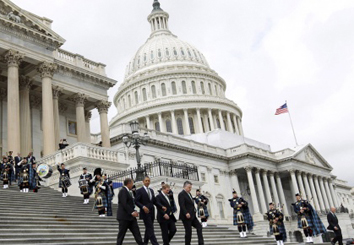Subscriber Benefit
As a subscriber you can listen to articles at work, in the car, or while you work out. Subscribe NowCongressional leaders on Tuesday unveiled a bipartisan deal to punt a government shutdown deadline into March, but House Republican infighting could still endanger any agreement and push federal agencies to the brink of shuttering this weekend.
The stopgap funding bill, called a continuing resolution or CR, extends federal funding until March 14. The measure includes $110.4 billion for disaster relief and approves a pair of local priorities, clearing the way for the District of Columbia to take over land so it can negotiate with the NFL’s Washington Commanders for a possible stadium, and committing the federal government to pay the full cost to rebuild Baltimore’s collapsed Francis Scott Key Bridge.
It also bans a controversial practice by pharmacy benefit managers, a middleman between patients and insurance firms, called “price spreading,” in which managers keep a portion of the charges for prescription medications.
Congressional Republicans, led by House Speaker Mike Johnson of Louisiana, originally sought to restrict the bill to a simple funding extension. Without new legislation, government agencies will shut down at 12:01 a.m. Saturday.
But the non-spending priorities—including $10 billion in extra farm aid, the health-care policy changes, the D.C. stadium issue and Baltimore’s bridge—threatened to turn a routine spending short-term bill into a dreaded end-of-year “Christmas tree,” decorated with lawmakers’ pet projects, and to imperil Johnson’s speakership.
He must win the votes of 218 House Republicans in the new Congress to continue in the post in 2025, and many members of the GOP conference are already grumbling about provisions in the legislation.
“This is a small CR that we’ve had to add things to that were out of our control,” Johnson said Tuesday. “These were not man-made disasters, these were things that the federal government has an appropriate role to do. I wish it weren’t necessary. I wish we didn’t have record hurricanes in the fall. I wish farmers were not in a bind such that creditors are not able to lend to them anymore. We have to be able to help those who are in these dire straits, and that’s what the volume of the pages to this is.”
The legislation sends $29 billion to the Federal Emergency Management Agency, $21 billion to the Agriculture Department and another $10 billion in additional aid to farmers and ranchers. It also replenishes the Small Business Administration’s disaster loan program, which exhausted its lending authority after hurricanes Helene and Milton ripped through the Southeast, slamming parts of Florida and North Carolina.
“They are counting on us to deliver the resources they need to get back on their feet, to rebuild essential infrastructure, and recover in the wake of devastation,” Senate Appropriations Committee Chair Patty Murray, D-Washington, said. “They are watching and wondering whether Congress is going to help them. And we have to answer with a resounding yes by getting this package across the finish line.”
But the high cost of the disaster aid—and the wins Democrats were able to notch in the bill—upset right-wing hard-liners within the House Republican conference. And to pass the measure before the deadline, Johnson may need support from Democrats to circumvent those members, who in past spending fights have thrown up roadblocks that tilted the government to the verge of a shutdown.
A similar dispute led to the ouster of Johnson’s predecessor, Kevin McCarthy, R-California, and Johnson’s speakership could hang in the balance.
“All they’ve done is tied emergency spending to a horrible spending bill to force people to rise up in righteous indignation and support a terrible piece of legislation,” said Rep. Tim Burchett, R-Tennessee, one of the eight Republicans who voted to depose McCarthy.
Maryland’s congressional delegation—dominated by Democrats—also wields outsize power on Congress’s spending committees, which eased the path for regional priorities. Senate leaders are eager to send Sen. Ben Cardin, D-Maryland—beloved by lawmakers for his affability and famous cocktail recipe—into retirement with funding for Baltimore’s bridge secured. State officials estimated the cost to rebuild the bridge at close to $2 billion.
“Congress is now committed to covering the full cost of replacing the bridge. This will allow the bridge it to be built as quickly as possible,” Cardin and Maryland Democrat Sen. Chris Van Hollen said in a joint statement.
The measure says the federal government can recoup some money for the bridge from judgments or legal settlements reached with the company that operated the cargo ship Dali, which crashed into the bridge on March 26, killing six construction workers who were filling potholes.
Please enable JavaScript to view this content.


So happy our leaders are concerned with making a deal for an NFL football team. I guess those are the priorities. Ridiculous this is even added. What a joke.
They could let DC be a state and get out of that business …
Joe B. nailed it. As long as the District is under federal control, Congress will have to actually govern DC. From sewers, sidewalks, streets, to big new stadiums.
The act of actual governance appears to be toxic to many members of Congress, D and R alike, who are just there for the sound bites…